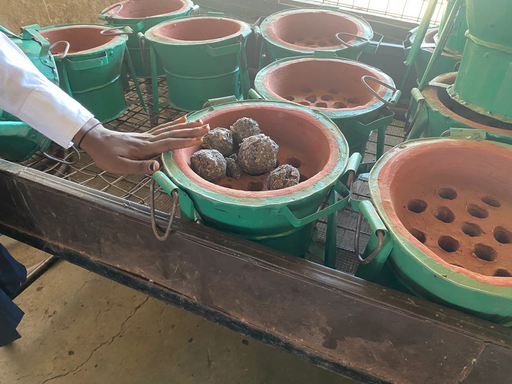One billion Africans have to cook on open fires or with fuel that is hazardous to their health and the environment, the International Energy Agency said on Friday.
The problem, which its report says can be easily solved, causes as much greenhouse gas emissions every year as the aviation industry.
Two billion people across the world still cook on open fires or with rudimentary stoves fed by wood, charcoal, agricultural waste or manure, the IEA report found.
"It is one of the greatest injustices of our time, especially in Africa,"
IEA head Fatih Birol told AFP, where four out of five households rely on open fires and burning wood.
These fuels pollute the air both indoors and outdoors with fine particles that penetrate the lungs and cause multiple respiratory and cardiovascular problems, the report said.
It also adds to the destruction of forests, natural sinks that trap carbon and help fight global warming.
African countries make progress despite challenges
The IEA estimates that 815,000 premature deaths occur each year in Africa alone due to poor indoor air quality, largely resulting from a lack of access to clean cooking methods.
Women and children suffer the most, spending hours each day searching for fuel, including firewood, and keeping the fire going.
‘’If we manage to transition to clean cooking solutions, of course the benefits will be then on less emissions, plus, of course, and this is really key to many countries in Africa saving the biodiversity by avoiding cutting trees to use the wood afterwards,’’ Syrine El Abed, the IEA's programme manager for East and Central Africa, told TRT Afrika.
The IEA says although a lot more work is required to tackle the crisis, some African countries have made progress in implementing policies towards banning cutting down of trees for charcoal as well as providing clean energy.
‘’A number of countries, a few countries have made really strong progress, and these are mainly Kenya and Tanzania by implementing and putting in place policies to allow the scalability and increase in access to clean cooking,’’ El Abed said.

This takes time away from paid employment or education, the report said.
A landmark IEA summit on the issue last year raised $2.2 billion in public and private sector commitments, as well as political pledges from 12 African governments.
Since then $470 million has been distributed, with concrete results already being seen, Birol insisted, citing a stove factory under construction in Malawi and an affordable stove programme developed in Uganda and Côte d'Ivoire.
The IEA report assesses the progress made a year after the summit and sets out a roadmap for African countries to be able to use clean cooking methods at low cost before 2040.
More tips on solution
Since 2010, nearly 1.5 billion people in Asia and Latin America, particularly in Brazil, India, and Indonesia, have got access to modern cooking stoves and fuels.
But the challenge remains immense in sub-Saharan Africa, where the number of people without access to clean cooking methods continues to grow.
As African countries make efforts to address the problem of harmful cooking practices and ensure clean cooking, there is the need to ‘‘mobilise the right investments from global partners and from partners on the African continent,’’ said Lerato Dorothy Mataboge, the African Union Commissioner for Infrastructure and Energy, adding this is in line with the African Union’s Dar es Salaam Declaration aimed at boosting clean energy provision.
‘‘Scientists have discovered is that for example, LPG gas, one is a cheaper source of energy and the emissions are not as harmful. So, it can be considered clean cooking and certain electricity, depending on how it's generated, can also be considered clean,’’ Mataboge told TRT Afrika.
The AU commissioner lamented that the majority of people affected by the harms of non-clean cooking are women and children, saying African countries aim to address the issue through the strategies outlined in the declaration by African countries.
‘’We are aiming to also make this a people-centered transition. We are also aiming to make sure that the people that will be heavily impacted by this transition to clean cooking do not get to bear an undue amount of cost,’’ Mataboge said.
‘’If we have to transition at one point from a free source of energy to one that is going to cost you, we need to be able to have a unified approach to say how are we going to bear the burden collectively,’’ she explained.
"For once and for ever this problem can be solved with an annual investment of $2 billion per year," IEA boss Birol added.
He stressed that the figure "is about 0.1 percent of global energy investment, which is nothing".
Alternative solutions are well known: electricity from solar panels, renewable gas and especially liquefied petroleum gas (LPG), a fossil fuel, which, while not ideal, is preferable than the loss of carbon sinks due to tree felling, Birol said.
The IEA said this would prevent 4.7 million premature deaths in sub-Saharan Africa by 2040 and reduce the continent's greenhouse gas emissions by 540 million tons per year, as much as the equivalent of the annual emissions of the global aviation sector.















